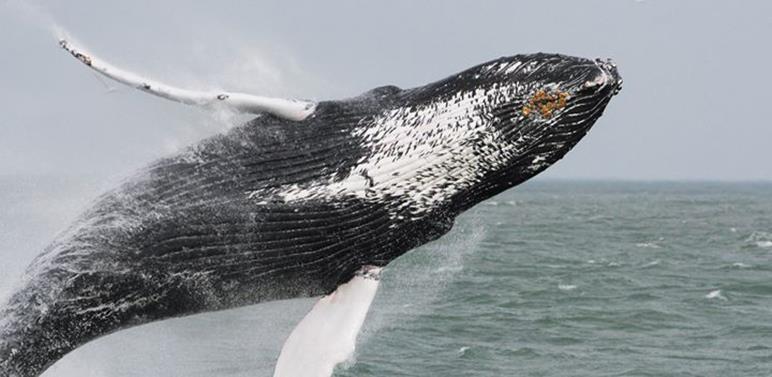
Mid-Atlantic boaters: Watch out for whales!
by NOAA Fisheries 9 Feb 2019 11:13 UTC

Mid-Atlantic boaters: Watch out for whales! © Kristin Rayfield, Rudee Tours
As large whales migrate along the Eastern Seaboard, remember to follow responsible wildlife viewing guidelines to keep everyone--whales and people-- safe!
Respect Their Space
Whales are large and need lots of space to feed, travel, and rest. In an underwater world, noisy boats can interrupt their activities, make whales nervous, or make them leave an area. Getting too close raises the risk for the whale of being hit by a boat or a propeller, and can cause injuries to boaters as well.
Reduce your risks and increase your chances of seeing natural, uninhibited whale behaviors by keeping a safe distance (100 feet for most whales, 1,500 feet for right whales). Use your zoom or a telephoto lens to capture the experience, or just relax and enjoy the awesome experience of sharing the water with whales.
If whales leave the area, it's their way of telling you they've had enough attention. Respect their space. It's also illegal to chase or in any way change a whale's natural behavior.
Approached by a Whale
Some whales are curious and approach boats on their own. In these cases, boaters should turn off engines until the whale is a safe distance away, then back away slowly.
Humpbacks have recently been sighted off of Virginia. Please use extreme caution when boating in these areas. If you are in Virginia and a whale deliberately approaches your boat, please take pictures and report the incident to the Virginia Aquarium & Marine Science Center at 757-385-7575, or to the Greater Atlantic Region Marine Animal Reporting Hotline at 866-755-6622 and Coast Guard Channel 16.
Whales are large and need lots of space to feed, travel, and rest. In an underwater world, noisy boats can interrupt their activities, make whales nervous, or make them leave an area. Getting too close raises the risk for the whale of being hit by a boat or a propeller, and can cause injuries to boaters as well.
How to Help
The best ways you can help keep whales safe are to go slow, stay back, keep a close watch, and report problems.
If a whale is entangled, don't risk your life by attempting to remove the gear yourself. You could actually make the entanglement worse. Your role is still the most important one--call our hotline or the Coast Guard immediately so trained responders can locate the whale and remove the gear safely (and legally).
If you can stay within a safe distance of the whale for awhile, or even until responders arrive, you will increase the whale's chances of being successfully rescued.
Your Choices Matter
Whether you choose how to maneuver your boat when whales are in the area, or how you choose a whale watching tour, your choices impact the lives of whales in our waters. Many Mid-Atlantic whale watches participate in a voluntary responsible whale watching program called Whale SENSE. Whale SENSE is currently celebrating its 10th anniversary! See a list of participating whale watch companies and find out more about responsible whale watching.
Report entangled, injured, or dead marine mammals or sea turtles to the Greater Atlantic Marine Animal Reporting Hotline: 866-755-6622. In Virginia, call the Virginia Aquarium & Marine Science Center at 757-385-7575.
Report suspected violators of marine regulations to NOAA's Office of Law Enforcement: 800-853-1964.
For more information contact Jennifer Goebel at 978-281-9175.